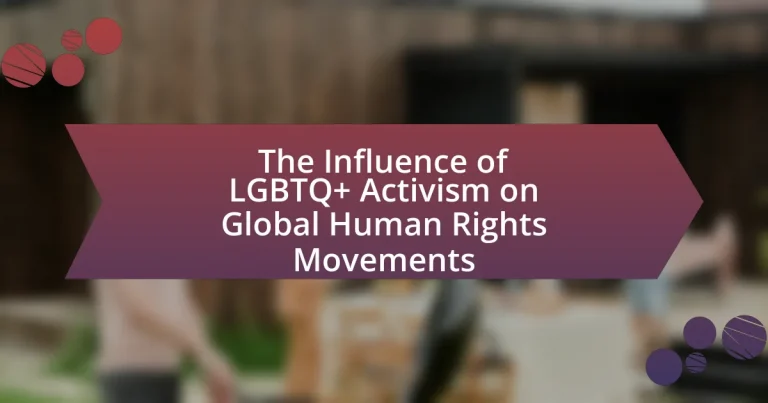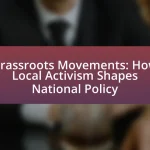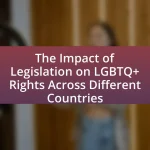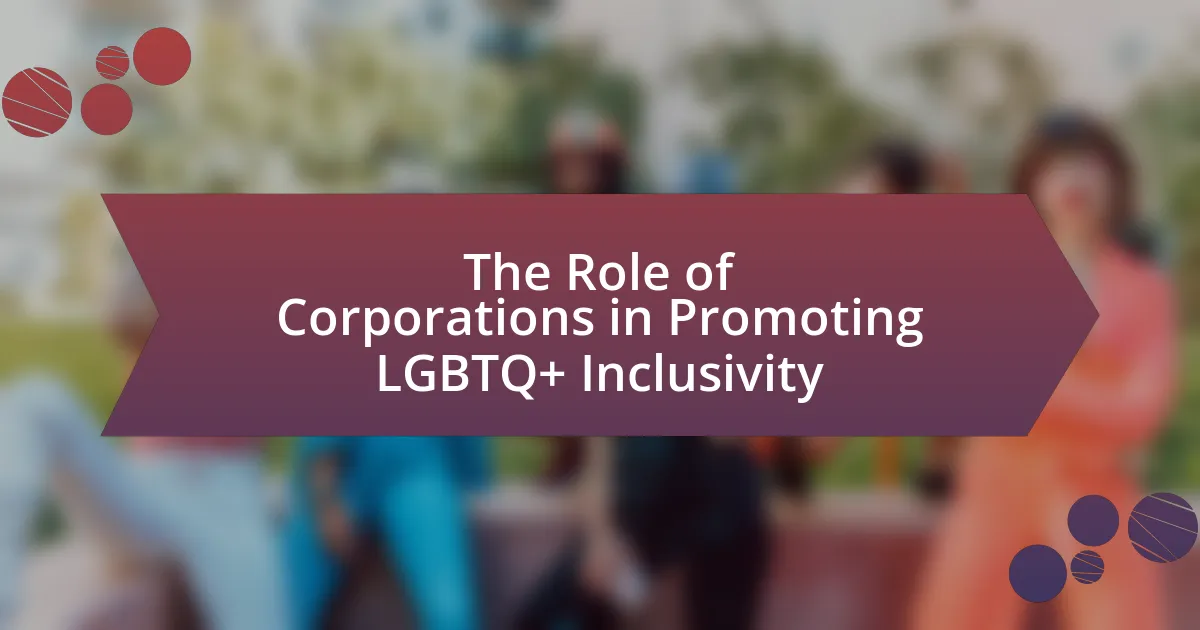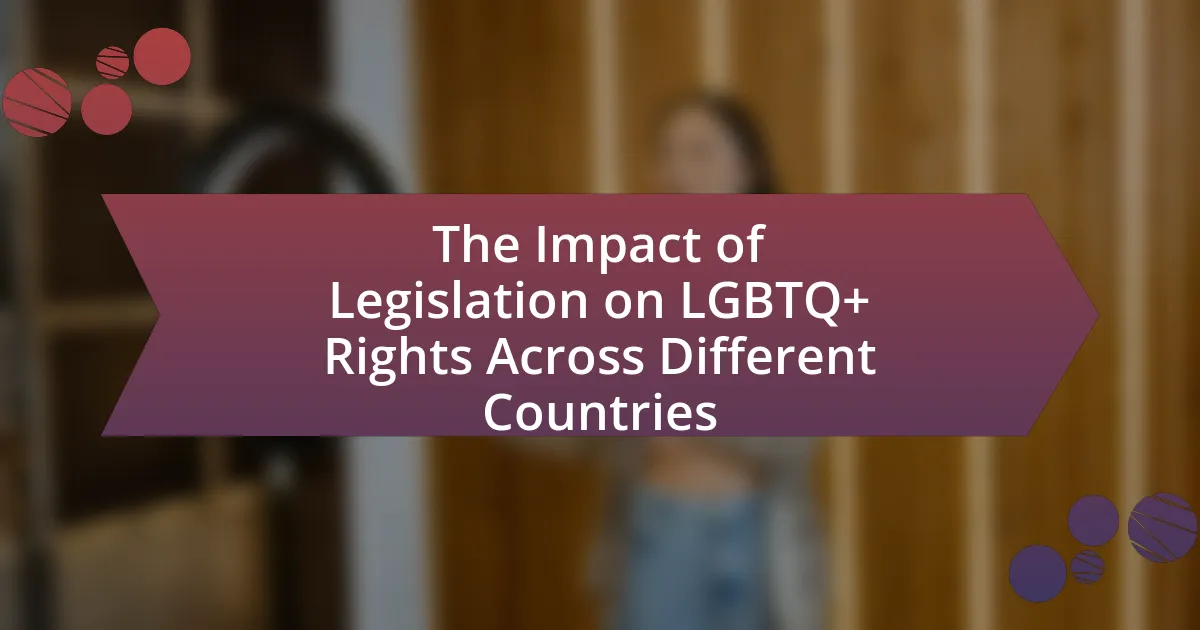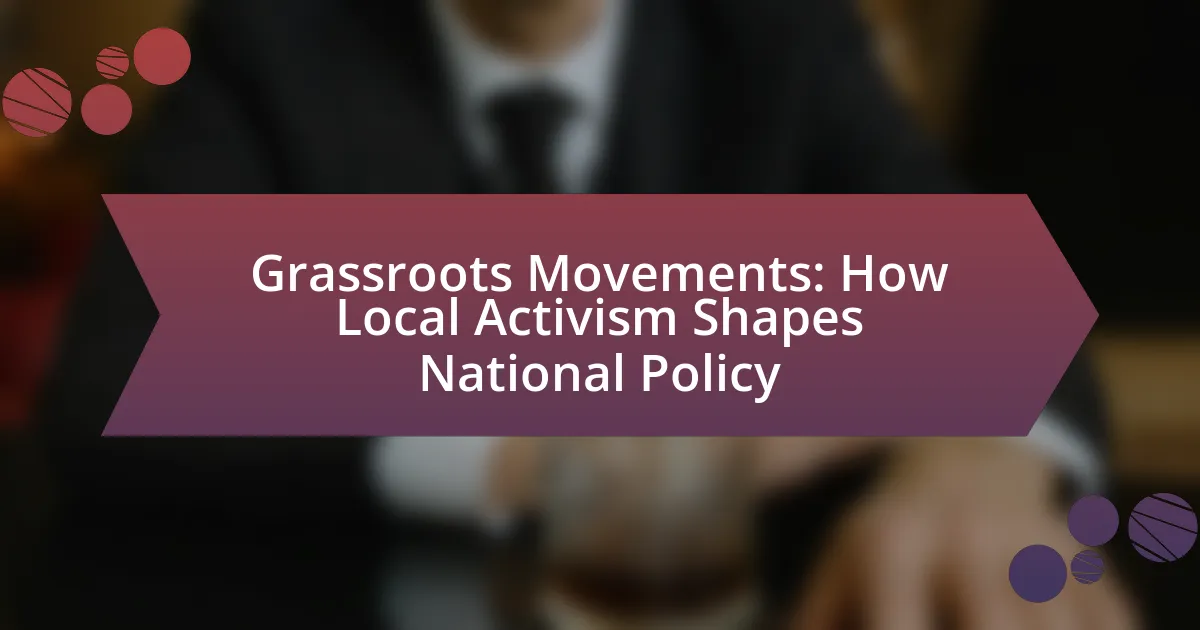LGBTQ+ activism plays a crucial role in shaping global human rights movements by advocating for equality and social justice, leading to significant legal and social advancements. This activism has prompted international organizations to address LGBTQ+ rights explicitly, influencing frameworks such as the Yogyakarta Principles and resulting in the decriminalization of homosexuality in numerous countries. Key historical events, such as the Stonewall Riots, and influential figures have mobilized communities and inspired intersectional approaches to discrimination. Despite facing challenges like legal discrimination and cultural opposition, LGBTQ+ activism continues to impact policy changes, promote awareness, and foster solidarity across various social justice movements, ultimately enhancing the recognition of human rights for all individuals.

What is the Influence of LGBTQ+ Activism on Global Human Rights Movements?
LGBTQ+ activism significantly influences global human rights movements by advocating for equality and social justice, which has led to broader recognition of human rights issues. This activism has prompted international organizations, such as the United Nations, to address LGBTQ+ rights explicitly, as seen in the 2011 UN Human Rights Council resolution that called for the decriminalization of homosexuality worldwide. Furthermore, LGBTQ+ movements have inspired intersectional approaches within human rights advocacy, emphasizing the interconnectedness of various forms of discrimination, thereby enhancing the overall effectiveness of global human rights campaigns.
How has LGBTQ+ activism shaped the landscape of human rights globally?
LGBTQ+ activism has significantly shaped the global landscape of human rights by advocating for legal recognition, anti-discrimination laws, and social acceptance. This activism has led to the decriminalization of homosexuality in numerous countries, with over 70 nations having repealed laws that criminalize same-sex relationships since the late 20th century. Furthermore, LGBTQ+ movements have influenced international human rights frameworks, such as the Yogyakarta Principles, which affirm that human rights apply to all individuals regardless of sexual orientation or gender identity. These efforts have resulted in increased visibility and support for LGBTQ+ rights, contributing to broader human rights discussions and policies worldwide.
What historical events marked the beginning of LGBTQ+ activism’s influence?
The beginning of LGBTQ+ activism’s influence is marked by the Stonewall Riots in 1969. These riots were a response to a police raid at the Stonewall Inn in New York City, which catalyzed the modern LGBTQ+ rights movement. Following the riots, the first Pride marches were organized in 1970, commemorating the events and advocating for LGBTQ+ rights, leading to increased visibility and activism. The significance of the Stonewall Riots is underscored by their role in mobilizing communities and inspiring subsequent movements for equality and human rights globally.
How have key figures in LGBTQ+ activism contributed to human rights movements?
Key figures in LGBTQ+ activism have significantly advanced human rights movements by advocating for legal reforms, raising awareness about discrimination, and fostering solidarity among marginalized communities. For instance, activists like Marsha P. Johnson and Sylvia Rivera played pivotal roles in the Stonewall Riots of 1969, which catalyzed the modern LGBTQ+ rights movement and highlighted the need for legal protections against discrimination. Their efforts contributed to the establishment of organizations such as the Gay Liberation Front, which sought to address broader human rights issues, including police brutality and social justice. Additionally, figures like Harvey Milk campaigned for political representation and equality, leading to the eventual legalization of same-sex marriage in various jurisdictions. These contributions have not only shaped LGBTQ+ rights but have also influenced global human rights frameworks, emphasizing the interconnectedness of various social justice movements.
Why is LGBTQ+ activism considered a vital part of the human rights discourse?
LGBTQ+ activism is considered a vital part of the human rights discourse because it addresses systemic discrimination and advocates for equal rights and protections for sexual and gender minorities. This activism has led to significant legal advancements, such as the legalization of same-sex marriage in numerous countries, which reflects a broader commitment to human rights principles that emphasize equality and non-discrimination. For instance, the 2015 U.S. Supreme Court ruling in Obergefell v. Hodges established that same-sex marriage is a constitutional right, illustrating how LGBTQ+ activism has reshaped legal frameworks to align with human rights standards.
What are the core principles of LGBTQ+ activism that align with human rights?
The core principles of LGBTQ+ activism that align with human rights include equality, non-discrimination, and the right to self-identify. Equality emphasizes that all individuals, regardless of sexual orientation or gender identity, should have the same legal rights and protections as others. Non-discrimination ensures that LGBTQ+ individuals are treated fairly in all aspects of life, including employment, healthcare, and education. The right to self-identify allows individuals to express their gender identity and sexual orientation without fear of persecution. These principles are supported by international human rights frameworks, such as the Universal Declaration of Human Rights, which asserts that all human beings are entitled to dignity and respect, regardless of their identity.
How does LGBTQ+ activism intersect with other social justice movements?
LGBTQ+ activism intersects with other social justice movements by advocating for the rights and dignity of marginalized groups, highlighting the interconnectedness of various forms of discrimination. For instance, LGBTQ+ activists often collaborate with racial justice movements to address issues such as police violence and systemic racism, recognizing that individuals can face multiple layers of oppression based on their sexual orientation, gender identity, and race. Research shows that the Stonewall Riots of 1969, a pivotal moment in LGBTQ+ history, were influenced by the civil rights movement, illustrating how these movements can inspire and support one another. Additionally, LGBTQ+ activism has increasingly aligned with feminist movements, emphasizing the importance of gender equality and challenging patriarchal structures that affect all genders. This intersectionality is crucial for creating comprehensive social justice frameworks that address the needs of diverse communities.
What challenges does LGBTQ+ activism face in promoting global human rights?
LGBTQ+ activism faces significant challenges in promoting global human rights, primarily due to legal discrimination, cultural opposition, and lack of political support. Legal discrimination manifests in many countries where same-sex relationships are criminalized, such as in over 70 nations where homosexuality is illegal, leading to persecution and violence against LGBTQ+ individuals. Cultural opposition often stems from deeply rooted societal norms and religious beliefs that view LGBTQ+ identities as unacceptable, creating hostile environments for activism. Additionally, political support is often lacking, as many governments prioritize other issues or actively suppress LGBTQ+ rights, undermining efforts to achieve equality and protection for LGBTQ+ individuals. These challenges hinder the effectiveness of LGBTQ+ activism in advocating for universal human rights.
What are the common obstacles encountered by LGBTQ+ activists worldwide?
LGBTQ+ activists worldwide commonly encounter legal discrimination, social stigma, and violence. Legal discrimination manifests in the form of laws that criminalize same-sex relationships or deny equal rights, affecting activists’ ability to advocate for change. Social stigma often leads to isolation and hostility from communities, hindering support for LGBTQ+ rights initiatives. Violence against LGBTQ+ individuals, including hate crimes, poses a significant threat to activists’ safety and effectiveness. According to the International Lesbian, Gay, Bisexual, Trans and Intersex Association (ILGA), 69 countries still criminalize same-sex relationships, illustrating the pervasive legal challenges faced by activists globally.
How do cultural differences impact the effectiveness of LGBTQ+ activism?
Cultural differences significantly impact the effectiveness of LGBTQ+ activism by shaping societal attitudes, legal frameworks, and the strategies employed by activists. For instance, in countries with conservative cultural norms, such as many in the Middle East and Africa, LGBTQ+ individuals often face severe legal penalties and social ostracism, which can hinder activism efforts and limit visibility. Conversely, in more progressive societies like those in Western Europe and North America, where LGBTQ+ rights are more widely accepted, activism can lead to substantial legal reforms and increased social acceptance. Research by the Pew Research Center indicates that acceptance of homosexuality varies greatly across cultures, with only 5% of people in countries like Nigeria supporting LGBTQ+ rights compared to over 80% in countries like Canada. This disparity illustrates how cultural contexts dictate the level of support and the methods of activism that can be effectively employed.
How does LGBTQ+ activism influence policy changes in human rights?
LGBTQ+ activism significantly influences policy changes in human rights by advocating for legal reforms and raising awareness about discrimination. Activists mobilize public opinion, engage in lobbying efforts, and utilize legal challenges to promote equality and protect rights. For instance, the legalization of same-sex marriage in numerous countries, such as the United States in 2015, was largely driven by sustained activism and public campaigns that highlighted the injustices faced by LGBTQ+ individuals. Additionally, organizations like Human Rights Campaign and ILGA World provide data and reports that underscore the need for policy changes, further validating the impact of activism on legislative processes.
What role do international organizations play in supporting LGBTQ+ activism?
International organizations play a crucial role in supporting LGBTQ+ activism by providing funding, advocacy, and a platform for global visibility. These organizations, such as the United Nations and Amnesty International, actively promote human rights standards that include protections for LGBTQ+ individuals, thereby influencing national policies and fostering a supportive environment for activism. For instance, the UN Free & Equal campaign raises awareness about LGBTQ+ rights and mobilizes support through educational initiatives and partnerships with local activists. Additionally, international organizations often document human rights abuses against LGBTQ+ individuals, which helps to hold governments accountable and encourages reform. This multifaceted support is essential for advancing LGBTQ+ rights on a global scale.

What are the specific impacts of LGBTQ+ activism on various human rights issues?
LGBTQ+ activism has significantly impacted various human rights issues by promoting equality, anti-discrimination laws, and social acceptance. For instance, the activism has led to the legalization of same-sex marriage in numerous countries, including the United States in 2015, which marked a pivotal moment in the recognition of LGBTQ+ rights as human rights. Additionally, LGBTQ+ advocacy has influenced anti-discrimination legislation, such as the Equality Act in the U.S., which aims to protect individuals from discrimination based on sexual orientation and gender identity. Furthermore, LGBTQ+ movements have raised awareness about issues like violence against marginalized communities, leading to increased reporting and policy changes aimed at protecting these groups. The global visibility of LGBTQ+ rights has also inspired other human rights movements, fostering solidarity and intersectionality among various marginalized communities.
How has LGBTQ+ activism affected laws regarding marriage equality?
LGBTQ+ activism has significantly influenced laws regarding marriage equality by advocating for legal recognition and equal rights for same-sex couples. This activism has led to landmark legal changes, such as the U.S. Supreme Court’s decision in Obergefell v. Hodges in 2015, which legalized same-sex marriage nationwide, citing the Fourteenth Amendment’s guarantees of equal protection and due process. Additionally, countries like Canada and the Netherlands have seen similar advancements, with marriage equality achieved through persistent advocacy and public support driven by LGBTQ+ organizations. These efforts have resulted in a global shift towards recognizing marriage equality as a fundamental human right, impacting legislation in numerous jurisdictions.
What legal milestones have been achieved through LGBTQ+ activism?
Legal milestones achieved through LGBTQ+ activism include the decriminalization of same-sex relationships in numerous countries, the legalization of same-sex marriage in over 30 nations, and the establishment of anti-discrimination laws protecting LGBTQ+ individuals. For instance, the U.S. Supreme Court’s 2015 decision in Obergefell v. Hodges legalized same-sex marriage nationwide, affirming the constitutional right to marry for same-sex couples. Additionally, the repeal of “Don’t Ask, Don’t Tell” in 2011 allowed LGBTQ+ individuals to serve openly in the U.S. military, marking a significant shift in policy. These milestones reflect the ongoing impact of LGBTQ+ activism on legal rights and societal acceptance globally.
How do these legal changes impact broader human rights protections?
Legal changes that support LGBTQ+ rights enhance broader human rights protections by establishing legal precedents that promote equality and non-discrimination. For instance, the legalization of same-sex marriage in various countries has not only affirmed the rights of LGBTQ+ individuals but has also influenced the legal frameworks surrounding marriage and family rights for all citizens, thereby reinforcing the principle of equality under the law. Additionally, these legal changes often lead to increased visibility and advocacy for marginalized groups, fostering a culture of acceptance and respect for diverse identities. This shift can be evidenced by the rise in anti-discrimination laws and policies that protect not only LGBTQ+ individuals but also other minority groups, thereby expanding the scope of human rights protections overall.
In what ways has LGBTQ+ activism addressed issues of violence and discrimination?
LGBTQ+ activism has addressed issues of violence and discrimination through advocacy for legal protections, public awareness campaigns, and support services. Activists have successfully lobbied for anti-discrimination laws in various countries, such as the legalization of same-sex marriage in the United States in 2015, which has contributed to reducing societal stigma and violence against LGBTQ+ individuals. Public awareness campaigns, like the “It Gets Better” project, have highlighted the experiences of LGBTQ+ youth facing bullying and violence, fostering a more inclusive environment. Additionally, organizations such as the Human Rights Campaign provide resources and support for victims of violence, emphasizing the need for comprehensive hate crime legislation. These efforts collectively aim to combat discrimination and promote safety for LGBTQ+ individuals globally.
What statistics highlight the impact of LGBTQ+ activism on violence prevention?
LGBTQ+ activism has significantly contributed to violence prevention, evidenced by a 2019 study from the Williams Institute, which found that states with comprehensive LGBTQ+ anti-discrimination laws experienced a 20% reduction in hate crimes against LGBTQ+ individuals. Additionally, the Human Rights Campaign reported that community-led initiatives, such as educational programs and awareness campaigns, have led to a 30% increase in reporting of hate crimes, indicating a greater willingness to address violence. These statistics underscore the effectiveness of LGBTQ+ activism in fostering safer environments and reducing violence against marginalized communities.
How do advocacy efforts change public perceptions of LGBTQ+ individuals?
Advocacy efforts significantly change public perceptions of LGBTQ+ individuals by promoting visibility, education, and acceptance. These efforts often include campaigns that highlight personal stories, which humanize LGBTQ+ experiences and challenge stereotypes. For instance, studies show that increased visibility of LGBTQ+ individuals in media correlates with greater public support for LGBTQ+ rights; a 2019 Gallup poll indicated that 70% of Americans support same-sex marriage, a rise from 27% in 1996, reflecting changing attitudes influenced by advocacy. Furthermore, educational initiatives that address misconceptions about LGBTQ+ identities contribute to reducing prejudice and fostering inclusivity, as evidenced by programs in schools that have led to more supportive environments for LGBTQ+ youth.
What role does education play in the influence of LGBTQ+ activism on human rights?
Education plays a crucial role in the influence of LGBTQ+ activism on human rights by fostering awareness, understanding, and acceptance of LGBTQ+ issues. Through educational initiatives, individuals learn about the history, struggles, and rights of LGBTQ+ communities, which helps to combat stereotypes and discrimination. For instance, comprehensive sex education that includes LGBTQ+ topics has been shown to reduce bullying and improve mental health outcomes for LGBTQ+ youth, as evidenced by research from the Gay, Lesbian & Straight Education Network (GLSEN). This increased awareness and acceptance contribute to broader societal support for human rights legislation and policies that protect LGBTQ+ individuals, thereby enhancing their rights and freedoms globally.
How do educational initiatives promote understanding of LGBTQ+ rights?
Educational initiatives promote understanding of LGBTQ+ rights by providing accurate information, fostering empathy, and challenging stereotypes. These initiatives often include curricula that cover LGBTQ+ history, legal rights, and the social challenges faced by LGBTQ+ individuals, which helps to create informed and supportive environments. For instance, studies show that schools implementing comprehensive sex education that includes LGBTQ+ topics report lower rates of bullying and increased acceptance among students. Furthermore, educational programs that involve community engagement and discussions with LGBTQ+ individuals can enhance personal connections and reduce prejudice, thereby promoting a more inclusive society.
What are the outcomes of inclusive education on human rights awareness?
Inclusive education significantly enhances human rights awareness by fostering an environment of acceptance and understanding among diverse groups. This educational approach promotes the recognition of individual rights and the importance of equality, particularly for marginalized communities, including LGBTQ+ individuals. Research indicates that inclusive education leads to increased empathy and reduced prejudice among students, which is crucial for cultivating a culture that values human rights. For instance, a study published in the “International Journal of Inclusive Education” by Florian and Linklater (2010) demonstrates that inclusive practices in schools contribute to greater awareness of social justice issues, thereby empowering students to advocate for their own rights and the rights of others.

What future trends can be anticipated in LGBTQ+ activism and human rights movements?
Future trends in LGBTQ+ activism and human rights movements will likely include increased intersectionality, digital activism, and global solidarity. Intersectionality will become more prominent as activists address the unique challenges faced by LGBTQ+ individuals who also belong to other marginalized groups, such as people of color and those with disabilities. Digital activism will continue to grow, leveraging social media platforms to mobilize support, raise awareness, and organize campaigns, as evidenced by the success of online movements like #BlackTransLivesMatter. Additionally, global solidarity will strengthen as LGBTQ+ activists collaborate across borders to combat oppressive regimes, reflecting the interconnectedness of human rights issues worldwide, as seen in international events like Pride celebrations that advocate for global LGBTQ+ rights.
How might technology shape the future of LGBTQ+ activism?
Technology will significantly shape the future of LGBTQ+ activism by enhancing communication, mobilization, and visibility. Digital platforms enable activists to connect globally, share resources, and organize events more efficiently, as evidenced by the success of social media campaigns like the #LoveWins movement, which played a crucial role in the legalization of same-sex marriage in the United States in 2015. Furthermore, technology facilitates the documentation of human rights abuses, allowing for real-time reporting and increased accountability, which is vital for advocacy efforts. The rise of virtual reality and augmented reality also offers innovative ways to create immersive experiences that foster empathy and understanding among broader audiences.
What digital platforms are most effective for LGBTQ+ advocacy?
Social media platforms such as Twitter, Instagram, and Facebook are the most effective for LGBTQ+ advocacy. These platforms enable rapid dissemination of information, mobilization of supporters, and creation of community networks. For instance, Twitter’s character limit encourages concise messaging, which has been instrumental in rallying support during events like Pride Month and the fight against discriminatory legislation. Instagram’s visual nature allows for impactful storytelling and awareness campaigns, while Facebook’s group features facilitate community building and event organization. According to a 2021 report by the Pew Research Center, 70% of LGBTQ+ individuals use social media to connect with others and advocate for their rights, highlighting the platforms’ significance in fostering activism and engagement.
How can social media amplify the voices of LGBTQ+ activists?
Social media amplifies the voices of LGBTQ+ activists by providing a platform for widespread visibility and engagement. Through platforms like Twitter, Instagram, and Facebook, activists can share their messages, mobilize support, and connect with a global audience, which enhances their reach and impact. For instance, the hashtag #LoveIsLove gained significant traction during the fight for marriage equality, illustrating how social media can unify and amplify diverse voices within the LGBTQ+ community. Additionally, studies show that social media campaigns can lead to increased awareness and support for LGBTQ+ rights, as seen in the 2015 U.S. Supreme Court ruling on same-sex marriage, which was influenced by the extensive online advocacy and visibility created by activists.
What emerging global issues could impact LGBTQ+ activism?
Emerging global issues that could impact LGBTQ+ activism include the rise of authoritarian regimes, climate change, and the ongoing COVID-19 pandemic. Authoritarian regimes often implement policies that suppress LGBTQ+ rights, as seen in countries like Hungary and Poland, where governments have enacted laws limiting LGBTQ+ visibility and rights. Climate change disproportionately affects marginalized communities, including LGBTQ+ individuals, by exacerbating social inequalities and limiting access to resources. The COVID-19 pandemic has also highlighted existing disparities, with LGBTQ+ populations facing increased health risks and economic instability, as evidenced by reports from organizations like the Human Rights Campaign, which noted heightened vulnerability among LGBTQ+ individuals during the crisis.
How do geopolitical changes affect LGBTQ+ rights worldwide?
Geopolitical changes significantly impact LGBTQ+ rights worldwide by altering legal frameworks, social attitudes, and international relations. For instance, the rise of authoritarian regimes often leads to increased repression of LGBTQ+ individuals, as seen in countries like Russia and Hungary, where laws have been enacted to restrict LGBTQ+ rights and promote anti-LGBTQ+ sentiment. Conversely, geopolitical shifts towards more progressive governance, such as in parts of Latin America and Western Europe, have resulted in the legalization of same-sex marriage and enhanced protections against discrimination. According to the International Lesbian, Gay, Bisexual, Trans and Intersex Association (ILGA), over 70 countries still criminalize same-sex relationships, highlighting how geopolitical contexts can perpetuate or challenge systemic discrimination against LGBTQ+ communities.
What role does climate change play in the future of human rights activism?
Climate change significantly impacts the future of human rights activism by exacerbating existing inequalities and creating new human rights challenges. As climate change leads to increased natural disasters, displacement, and resource scarcity, marginalized communities, including LGBTQ+ individuals, face heightened vulnerabilities. For instance, the United Nations has reported that climate change disproportionately affects low-income and marginalized populations, which often include LGBTQ+ individuals who may lack access to resources and support systems during crises. This intersection of climate change and human rights necessitates that activists address environmental issues as integral to their advocacy, ensuring that the rights of all individuals, particularly those in vulnerable positions, are protected and prioritized in climate action initiatives.
What practical steps can individuals take to support LGBTQ+ activism?
Individuals can support LGBTQ+ activism by participating in local advocacy groups, donating to LGBTQ+ organizations, and educating themselves and others about LGBTQ+ issues. Engaging with local advocacy groups allows individuals to contribute to community efforts and amplify LGBTQ+ voices. Donations to organizations such as the Human Rights Campaign or GLAAD provide essential funding for initiatives that promote equality and fight discrimination. Furthermore, educating oneself and others about LGBTQ+ history and rights fosters understanding and empathy, which are crucial for dismantling prejudice. According to a 2020 report by the Williams Institute, public support for LGBTQ+ rights has increased significantly, demonstrating the impact of informed advocacy on societal change.
